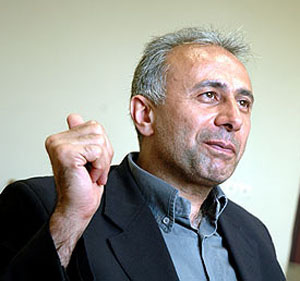Iran to Play a Major Role in the Region
Talk of negotiations between Iran and West started in 2005. It was from this year that the Iranian government decided to change its approach towards foreign relations. By Ebrahim Mottaqi, foreign affairs’ expert.

Speaking to BBC, Britian’s UN ambassador John Sawers has claimed that in 2005 Iran offered to stop attacking British troops in Iraq in return for West dropping its objections to Tehran’s uranium enrichment project. Now that West is inclined to start direct talks with Tehran, what are the implications of reminding previous contacts between Iran and West and Tehran’s tendency to bargain in the negotiations? Comment by Mottaqi, foreign affairs’ expert:
Iran’s diplomacy of negotiations started in 2005. It was from this year that the Iranian government fundamentally changed its approach towards foreign relations. At that time, Iranians had come to the belief that they had the required potential, domestically and internationally, to negotiate. They knew that lacking the necessary capabilities, tools and status, they had no chance to bargain in the talks.
The capabilities were acquired in 2005. However, Western countries, particularly the United States, did not follow a coherent, sustained policy in dealing with Iran. In fact, Americans supported diplomacy of negotiations and reconstructing relations with Iran while exerting the utmost political pressure and propaganda against our country, a paradox indeed.
Currently, the circumstances are prepared for negotiations. One cause is Obama’s popularity in Middle East. An article published in the latest issue of Foreign Affairs (the January-February issue) indicates that United States’ aggressive diplomacy in Middle East is about to change and US will move towards creating balance. Hence further opportunities for Iran to become a more significant regional actor.
The Bush administration followed a diplomacy intertwined with pressure, threat and radicalism but it seems that the incumbent administration is completely different. It will follow a moderate approach in dealing with Middle East states, particularly Iran. In such a climate, Iran finds a chance to bargain. There will be an opening for cooperation, impossible during Bush’s term with all the pressures and threats. To create equilibrium in the region, the Americans need to cooperate with different groups, even if it would be Taliban in Afghanistan.
Iran’s position and the role it can play impact the restive Middle East. Currently, the groundwork for talks is laid; however, the agenda and Iran and US intentions are the determining factors that have delayed the negotiations so far. The negotiations can move to several other domains. Up to now, the major part of our talks with Americans has been over Iraq. But with the current circumstances there should be an inclusive agenda. In other words, we can simultaneously talk over various issues that satisfy common interests of Iran and West/US. An aggressive diplomacy can not be ideal for Americans anymore. 8 years of containing Iran and putting it under diplomatic pressures weren’t beneficial either for US interests, regional stability and Iran’s strategic objectives. Hence, there will be a new climate relatively different from Bush’s era.
Iran’s diplomacy of negotiations started in 2005. It was from this year that the Iranian government fundamentally changed its approach towards foreign relations. At that time, Iranians had come to the belief that they had the required potential, domestically and internationally, to negotiate. They knew that lacking the necessary capabilities, tools and status, they had no chance to bargain in the talks.
The capabilities were acquired in 2005. However, Western countries, particularly the United States, did not follow a coherent, sustained policy in dealing with Iran. In fact, Americans supported diplomacy of negotiations and reconstructing relations with Iran while exerting the utmost political pressure and propaganda against our country, a paradox indeed.
Currently, the circumstances are prepared for negotiations. One cause is Obama’s popularity in Middle East. An article published in the latest issue of Foreign Affairs (the January-February issue) indicates that United States’ aggressive diplomacy in Middle East is about to change and US will move towards creating balance. Hence further opportunities for Iran to become a more significant regional actor.
The Bush administration followed a diplomacy intertwined with pressure, threat and radicalism but it seems that the incumbent administration is completely different. It will follow a moderate approach in dealing with Middle East states, particularly Iran. In such a climate, Iran finds a chance to bargain. There will be an opening for cooperation, impossible during Bush’s term with all the pressures and threats. To create equilibrium in the region, the Americans need to cooperate with different groups, even if it would be Taliban in Afghanistan.
Iran’s position and the role it can play impact the restive Middle East. Currently, the groundwork for talks is laid; however, the agenda and Iran and US intentions are the determining factors that have delayed the negotiations so far. The negotiations can move to several other domains. Up to now, the major part of our talks with Americans has been over Iraq. But with the current circumstances there should be an inclusive agenda. In other words, we can simultaneously talk over various issues that satisfy common interests of Iran and West/US. An aggressive diplomacy can not be ideal for Americans anymore. 8 years of containing Iran and putting it under diplomatic pressures weren’t beneficial either for US interests, regional stability and Iran’s strategic objectives. Hence, there will be a new climate relatively different from Bush’s era.

